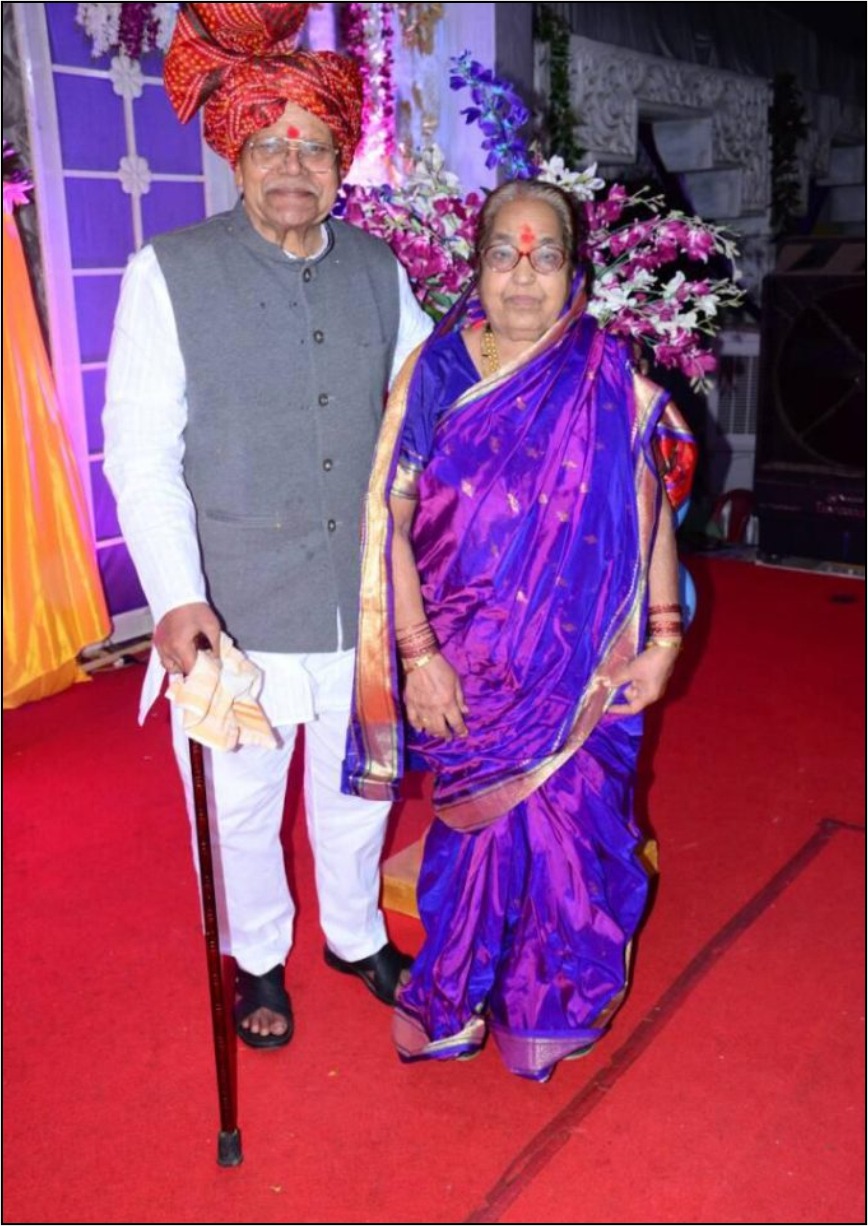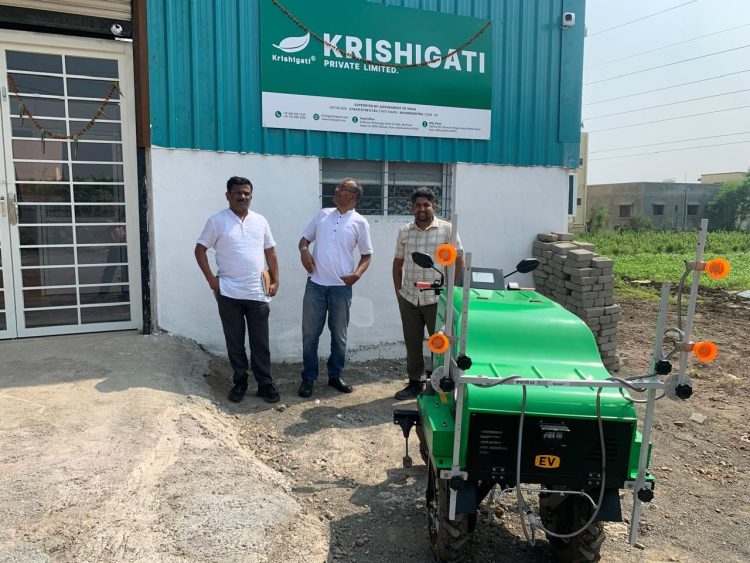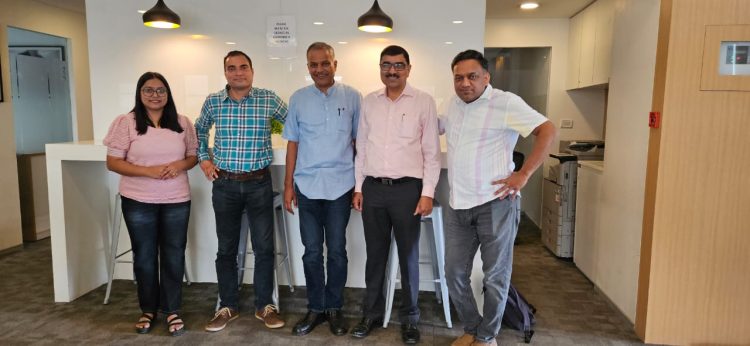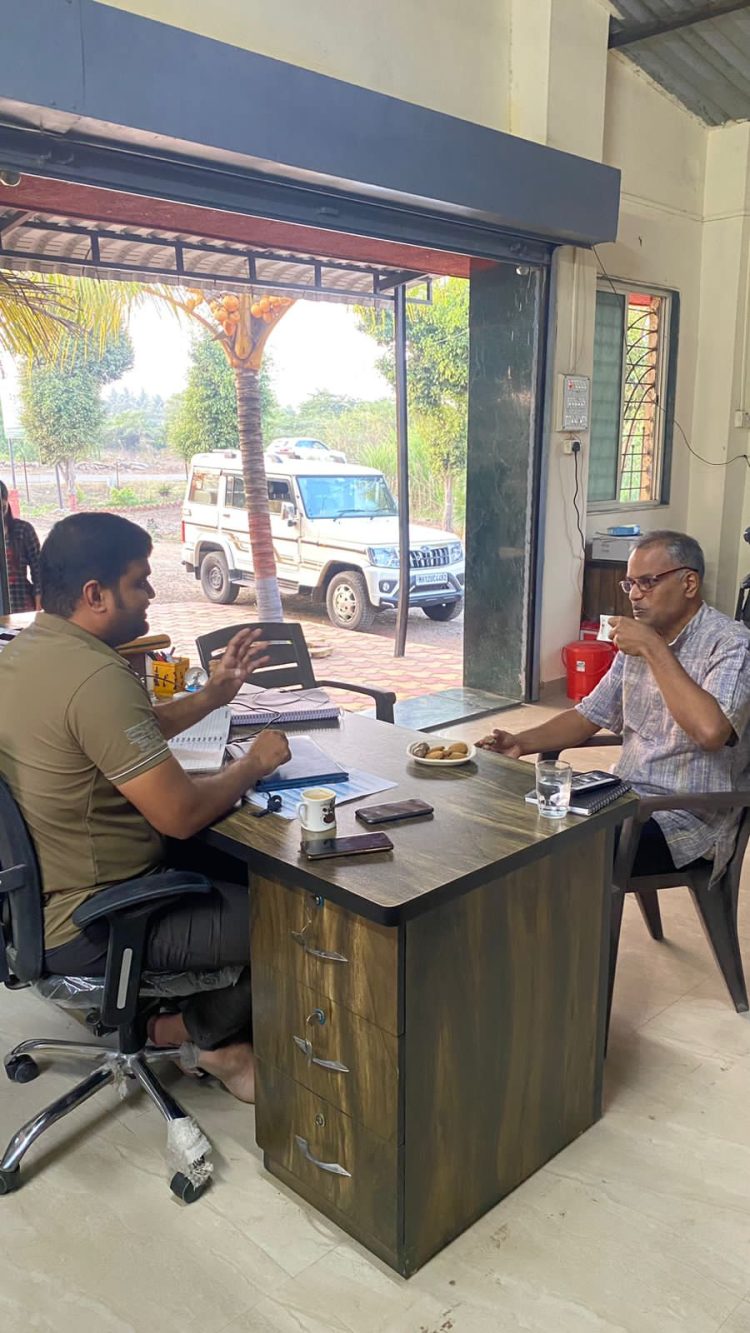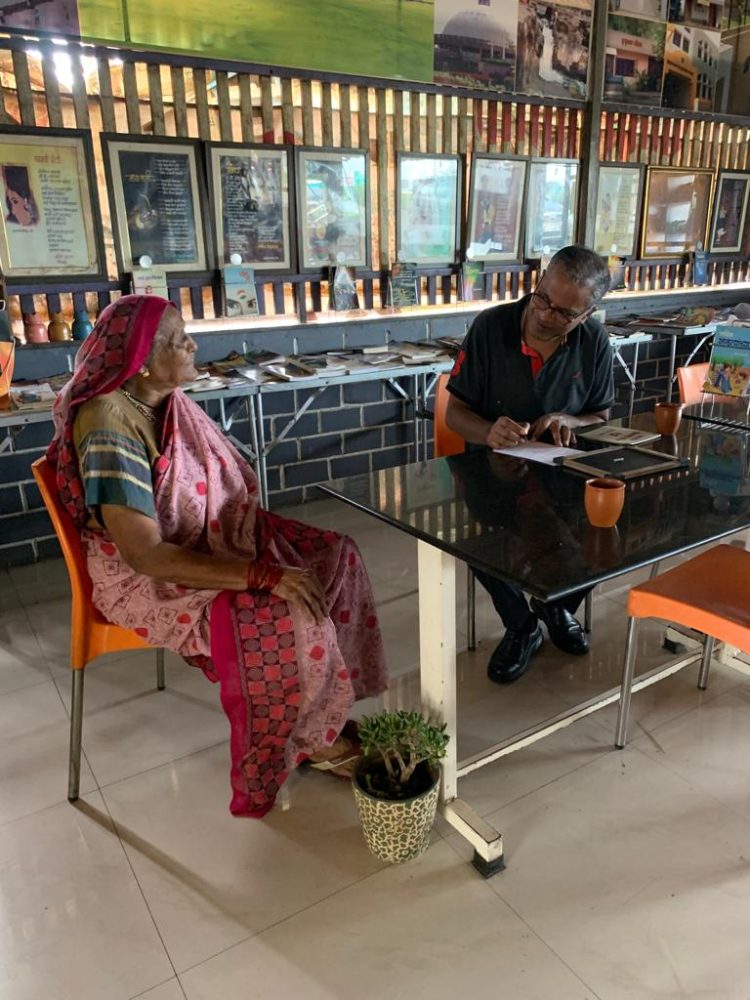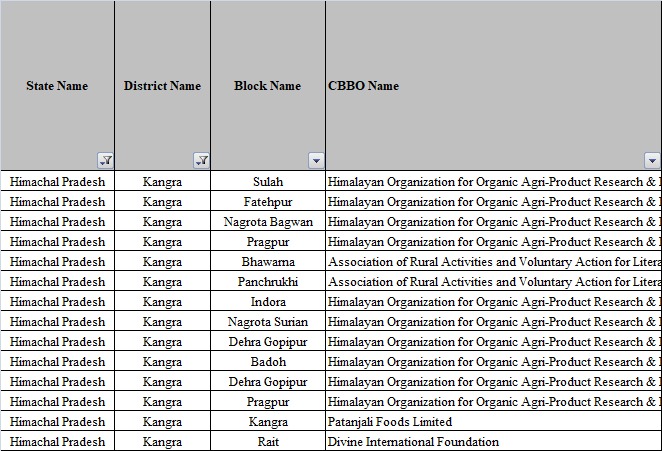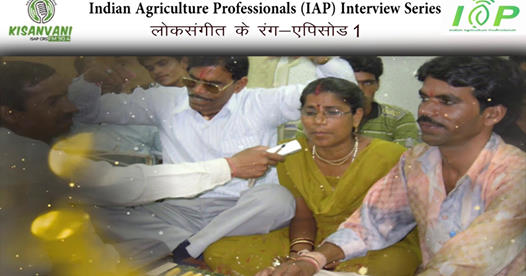FEATURED
Ode to my Mother
Posted on 22 Nov 2025
by Sunil Khairnar
My mother is the reason I am in existence and she is the single most reason for whatever little I have done in my life.
...
Read More
Digital Extension platforms of ISAP
Posted on 17 Dec 2025
by Sunil Khairnar
Indian Society of Agribusiness Professionals (ISAP) and its incubator arm Indigram Labs Foundation(ILF), both Section 8, not for profit entities, have been deploying social media extensively for knowledge sharing, information exchange and networking. Nearly 700,000 agri-professionals ranging from start-ups, influencer farmers, Farmer Producer Organizations (FPOs), Scientists, researchers, employees of govt and private sector bodies are connected as a part of our social media groups/pages. Such platforms under the I...
Read More
Why FPOs should be treated as startups?
Posted on 17 Dec 2025
by Sunil Khairnar
This was more than 1 year ago. I didn’t know that someone actually recorded the proceedings and uploaded on the net. 🙂
FPOIndian_Agriculture_ProfessionalsIndian_Society_of_Agribusiness_ProfessionalsIndigram_Labs_FoundationISAPStartupssunil_daga_khairnarSunil_Khairnar
...
Read More
Bagri Milk Parlor: Inspiring story!
Posted on 17 Dec 2025
by Sunil Khairnar
This is an inspiring story of a young man from a farming family in Distt Charkhi Dadri Haryana, who started Bagri Milk Parlor in 2018 and which has become a known brand in Haryana. An MBA graduate, Mr Pradeep Sheoran was drawing a very good package in a multinational company but quit the job to follow his passions. It was a very difficult decision for Mr Pradeep who is from a farming family background with very limited resources. Today he is an inspiration to all aspiring entrepreneurs in the Milk and Milk Products...
Read More
Business model out of silage by a FPO in a drought prone area
Posted on 17 Dec 2025
by Sunil Khairnar
Spectacular success of a FPO pioneering a silage driven business model
This is an inspiring story of a Farmer Producer Organization (FPO) from Marathwada. This region has traditionally been prone to drought and hardly 10% of this region is under irrigation and has seen agrarian distress quite often. A FPO called Swarup Shetkari Farmer Producer Company Limited in this region has evolved as a successful business enterprise under the able leadership of Sh Deepak Chavan who left his job in the Pharma Industry to fol...
Read More
करोड़पति इन्नोवेटिव किसान मौ इदरिस कादरी साहब
Posted on 17 Dec 2025
by Sunil Khairnar
अभूतपूर्व इच्छाशक्ति और बेहतरीन कृषि प्रबंधन की मिसाल है कर्नाटक की बगदल तहसील का कादरी एग्रो फार्म पशुपालन, बागवानी, वर्मी कम्पोस्ट और कम वर्षा में भी अधिक उत्पादन, जी हाँ यदि कम संसाधनों का भी उचित प्रबंधन किया जाए तो कम वर्षा वाले क्षेत्र में भी 90 टन प्रति एकड़ गन्ने की फसल ली जा सकती है | 2014 में जगजीवन राम अभिनव किसान पुरस्कार से सम्मानित मोहम्मद इदरिस अहमद कादरी कर्नाटक राज्य के बिदर जिले की बगदल तहसील के रहने वाले हैं और खेती किसानी के अलावा अच्छी किस्म के पशु जिसमें गाय,भैंस,बकरी यहाँ तक की घोड़े पालने के...
Read More
Mohamad Abdul Idris Qadri – Inspirational story of a pious crorepati farmer from Karnataka
Posted on 17 Dec 2025
by Sunil Khairnar
Sh Mohammad Abdul Qadri is a very pious farmer in Bagdal taluka of Bidar district. He has been able to turn his fortune with sheer hard work and has mastered the art of water conservation in this dry belt. He is now taking record yield of Sugarcane on his farms, which is a water intensive crop. He has brought some cultivars of sugarcane from abroad including the countries like Australia and Brazil. He gets record yields of sugarcane in this dry belt which is quite a miracle. He also has preserved nearly 17 varietie...
Read More
जैविक खेती और देशी उत्पाद बनाकर अच्छा लाभ ले रहे हरियाणा के राजपाल श्योराण की कहानी
Posted on 17 Dec 2025
by Sunil Khairnar
जैविक खेती और उनसे बने उत्पादों से कैसे लाभ कमाया जा सकता है, ये सिखा रहे हैं हरियाणा के छोटे से गाँव में रहने वाले राजपाल सिंह श्योराण | अपने खेतों में उगी सरसों से तेल और बाजरे से बिस्किट बनाकर बेचने वाले श्योराण साहब जैविक उत्पादों की और भी चीज़ें बनाना चाहते हैं |
...
Read More
How to select good quality Agri Inputs like Seeds & Agrochemicals
Posted on 16 Dec 2025
by Sunil Khairnar
“फीफा-एफपी/कॉप सोसाइटी आत्मनिर्भरता अभियान” Episode 5
“सीड्स और एग्रोकेमिकल्स जैसे अच्छी गुणवत्ता वाले एग्री इनपुट का चयन कैसे करें?”
वक्ता:- श्री विजय सरदाना, टेक्नो-लीगल और एग्रीबिजनेस में एग्री-ट्रेड एक्सपर्ट |
...
Read More
“Blue Revolution 2.0- How RAS technology can help Indian fish-farmers raise income"
Posted on 16 Dec 2025
by Sunil Khairnar
फीफा-एफपीओ / कॉप सोसाइटी उद्यमिता अभियान Episode 6
वक्ता:- श्री सुवो सिरकार – सीटीओ, संस्थापक, एसएनआरएएस |
SNRAS भारत में एक नैनो-एक्वाकल्चर प्रणाली का नेतृत्व करता है जिसे BLUEBOX कहा जाता है | (Patent: 201921026336, 201921034490 | Trademark: 2397456) जो एक फिल्ट्रेशन प्रणाली है, और मौजूदा एक्वाकल्चर टैंकों, तालाबों, और पिंजरों के साथ पंप-इन और पंप-आउट के साथ एकीकृत और अपग्रेडेड है, लूप में लगातार एक ही पानी को पंप करता है ताकि उच्च उत्पादन को बनाए रखने के लिए परिवेशी जल गुणवत्ता मापदंडों को प्राप्त किया जा सके ...
Read More
“How Goda farms built a 200 crore business ? How can other FPOs learn from their experience ?"
Posted on 16 Dec 2025
by Sunil Khairnar
“फीफा-एफपीओ/कॉप सोसाइटी आत्मनिर्भरता अभियान” Episode 9″
कैसे गोदा फार्म ने बनाया 200 करोड़ का कारोबार ? अन्य एफपीओ इनके अनुभवों से कैसे सीख सकते हैं?”
वक्ता: श्री नितिन चव्हाण, मैनेजिंग डायरेक्टर, गोदा फार्म ग्रुप |
श्री नितिन जी, गोदा फार्म्स ग्रुप के प्रबंध निदेशक हैं । गोडा फर्म्स की स्थापना 26 अगस्त 2016 को की गई थी । यह किसान केंद्रित दृष्टिकोण अपनाते हुए उत्पादन लागत को कम करने, मूल्य श्रृंखला विकसित करने, वांछित गुणवत्ता के साथ उत्पादकता बढ़ाना के लिए के लिए प्रबुद्ध है | जो किसानों और अंतिम उपयोगकर्ताओ...
Read More
Insure Life with PLI and RPLI
Posted on 15 Dec 2025
by Sunil Khairnar
“फीफा-एफपी/कॉप सोसाइटी उद्यमिता अभियान” Episode 10
“जीवन सुरक्षित करें PLI & RPLI के साथ ।”
वक्ता: श्री राज कुमार मिश्रा, जनरल मैनेजर (B&I), डाक जीवन बीमा निदेशालय, भारत सरकार|
श्री राज केआर मिश्रा जी वर्तमान में डाक जीवन बीमा निदेशालय, भारत सरकार में जनरल मैनेजर (B&I), के रूप में अपनी सेवाएं प्रदान कर रहे हैं । 150 से अधिक वर्षों से डाक विभाग (DoP) देश के संचार की रीढ़ रहा है और इसने देश के सामाजिक आर्थिक विकास में महत्वपूर्ण भूमिका निभाई है । 1,55,531 डाकघरों के साथ, DoP दुनिया में सबसे व्यापक रूप से वितरित ...
Read More
India is blessed with entrepreneurs like Tukaram
Posted on 15 Dec 2025
by Sunil Khairnar
I was happy to meet Tukaram Sonawane along with Deepak Chavan. Tukaram is the co-founder of Krishigati and he exemplifie...
Read More
Shri Vasudev Kathe Ji – A Krishi Rishi of Nashik Grape's
Posted on 15 Dec 2025
by Sunil Khairnar
I was delighted to meet Shri Vasudev Kathe ji in Nashik a few days ago. Nashik is truly fortunate to have many Krishi Rishis of his stature, who continue to guide farmers in the region and across India. Shri Kathe ji has made remarkable contributions, especially in the field of grape cultivation:
Authored four books on grape farming, focusing on practical, field-tested solutions to real challenges.
Leads the Dabholkar-inspired Prayog Pariwar farmer-learning network (~50 local cells, ~3,000 farmers in biannual m...
Read More
BoreCharger Scaling Sustainable Water Solutions for Rural India - Rahul Bakare & Vinit Phadnis
Posted on 15 Dec 2025
by Sunil Khairnar
Rahul Bakare and Vinit Phadnis from Urdhvam Environmental Technologies (BoreCharger) are doing something truly remarkable. Both come from farming families, and they’ve developed groundbreaking technology to address one of India’s most pressing challenges — the water crisis.
Their patented BoreCharger can literally bring dry borewells back to life. Imagine farmers who once managed to pump water for just 30 minutes a day, now being able to access water for 6+ hours! That’s the kind of transformation they are drivi...
Read More
Building Sustainable Agri-Food Ecosystems Insights from Dr. Kamble & Mr. Lele
Posted on 15 Dec 2025
by Sunil Khairnar
A privilege to meet two remarkable professionals shaping India’s food and agribusiness ecosystem — Dr. Umesh Kamble and Mr. Nilesh Lele — during my recent visit to Mumbai. Both are partners, collaborating across multiple entrepreneurial ecosystem ventures.
🔹 Dr. Umesh Kamble — a seasoned food science technocrat with 20+ years of expertise in regulatory, safety, and ESG across food, pharma, and cosmetics. Through Farm to Fork Solutions, RP Molecules to Market LLP, and Waste to Best, he is driving compliance, sust...
Read More
FARMWATT Innovations' partnership with UK's Rika Biotech and their work in transforming India's agriwaste-to-energy sector
Posted on 15 Dec 2025
by Sunil Khairnar
It was a pleasure facilitating an introduction between Kumar Neelendu, Founder of Farmwatt, and Ajay Patil ji in Delhi t...
Read More
Business model out of silage by a FPO in a drought prone area
Posted on 07 Dec 2025
by Sunil Khairnar
Spectacular success of a FPO pioneering a silage driven business model
This is an inspiring story of a Farmer Producer Organization (FPO) from Marathwada. This region has traditionally been prone to drought and hardly 10% of this region is under irrigation and has seen agrarian distress quite often. A FPO called Swarup Shetkari Farmer Producer Company Limited in this region has evolved as a successful business enterprise under the able leadership of Sh Deepak Chavan who left his job in the Pharma Industry to follo...
Read More
जैविक खेती और देशी उत्पाद बनाकर अच्छा लाभ ले रहे हरियाणा के राजपाल श्योराण की कहानी
Posted on 07 Dec 2025
by Sunil Khairnar
जैविक खेती और उनसे बने उत्पादों से कैसे लाभ कमाया जा सकता है, ये सिखा रहे हैं हरियाणा के छोटे से गाँव में रहने वाले राजपाल सिंह श्योराण | अपने खेतों में उगी सरसों से तेल और बाजरे से बिस्किट बनाकर बेचने वाले श्योराण साहब जैविक उत्पादों की और भी चीज़ें बनाना चाहते हैं |...
Read More
Scanit Revolutionizes Agriculture with Early Pathogen Detection: Transforming Crop Health in India and Beyond
Posted on 04 Jan 2025
by Sunil Khairnar
Scanit, founded by founded by Pete Manautou and Jaydeep Rane, exemplifies innovation in agricultural technology by addressing a critical gap in disease detection. As a global ag-tech startup, it has developed the multi-patented SporeCam, which provides early disease-detection-as-a-service by capturing the most elusive datapoint for crop disease forecasts: real-time, hyperlocal pathogen presence, completing the disease triangle.
This technology empowers farmers to enhance targeted scouting and optimize agrochemical...
Read More
Kiran Antre: A Visionary Agropreneur Redefining Sustainable Farming
Posted on 23 Dec 2024
by Sunil Khairnar
Kiran Antre, a Nashik-based entrepreneur and agricultural expert, stands as a shining example of a hashtag#ChildrenofFarmerEntrepreneur. With over a decade of experience, he has established a strong presence in the agrochemical industry, combining his agricultural roots with a passion for innovation. During my visit to his factory today, I was deeply impressed by his remarkable achievements in his mid-thirties, a young age for someone with such an extensive entrepreneurial portfolio.
Antre has founded and direct...
Read More
Bioeconomy in Focus: Prasad Bhai’s Expertise and Dedication
Posted on 25 Jan 2024
by Sunil Khairnar
Recently, I had the opportunity to spend time with Prasad and Kiran Ji, along with other individuals, at GK91 Bioeconomy...
Read More
Legacy of Agriculture: 70 Years of Excellence with Padgilwar Corporation
Posted on 24 Jan 2024
by Sunil Khairnar
I spent some time recently in Pune with Sagar Padgilwar ji of Padgilwar Corporation whose family has been in the Agri eq...
Read More
Exploring Millet Marvels: A Visit to Agrozee’s Founder, Mahesh Londhe
Posted on 23 Jan 2024
by Sunil Khairnar
Visited Mahesh Londhe founder Agrozee recently who works out of a small village near Urali Kanchan. He is doing some gre...
Read More
Empowering Rural Innovation: The Inspiring Founders of TECHENCE
Posted on 10 Oct 2023
by Sunil Khairnar
Great meeting and lunch with Parmeshwar and Nitin the promoters and founders of TECHENCE which is Poultry industry focus...
Read More
Inspiring Farmer-Led Startup with 8 Co-Founders
Posted on 09 Oct 2023
by Sunil Khairnar
Met the absolutely brilliant team of 8 cofounders of a bootstrapped and profitable startup recently.
All 8 are farmers ...
Read More
Sanmitra FPC !!
Posted on 07 Oct 2023
by Sunil Khairnar
Met a great team of leaders from Sanmitra FPC recently. They are into procurement, marketing and primary processing. The...
Read More
The Amazing Bhimabai!!
Posted on 06 Oct 2023
by Sunil Khairnar
I met one of the most amazing persons of my life today in the form of Shrimati Bhimabai Sampat Jondhale. Bhimabai is the...
Read More
AgriTalk with Sunil Khairnar, Director, Indigram Labs
Posted on 31 Mar 2021
by Sunil Khairnar
Indigram Labs is one of the very few incubators in the country that solely focuses on food and agriculture. With the rise of startups in these sectors, what are the major changes you are seeing?
Our estimation is that there are more than 1000 startups in this space trying to address solutions across all the verticals in Agri & Food Domains. We also see a trend of non-ag background folks coming into this sector. With the rise in funding in terms of the quantum of deals we’re beginning to see good talent being attra...
Read More
Transforming agriculture through village-level infrastructure
Posted on 25 Mar 2021
by Sunil Khairnar
With agricultural reforms under the spotlight currently, the government needs to consider a massive village-level infrastructure project with measures like enhancing the storage of produce and establishing gram mandis or haats. Not only would this add value to the agricultural supply chain, it would also empower rural units and the farmer community, ultimately leading to a quicker post-Covid recovery for the Indian economy.
The Government of India has set in motion reforms which will lead to the eventual develop...
Read More
Building Innovators
Posted on 25 Mar 2021
by Sunil Khairnar
Education in agriculture needs to undergo shifts from a production mindset to a market-oriented mindset. Academics and industry linkages need to be deepened and strengthened. Academics and startups need to be in constant dialogue and collaborate to bring positive changes in the lives of Indian farmers. The FPO movement in India also needs strong support from the agricultural education system. Entire curriculums needs to be made contemporary given the tectonic shifts taking place in the sector.
I will detail out ...
Read More
Converging eNAM network with private mandis
Posted on 25 Mar 2021
by Sunil Khairnar
This can be the key to efficient price discovery so that farmers are ensured best realisation for their produce
The National Agriculture Market (NAM) was envisaged as a pan-India electronic trading portal launched on April 14, 2016 completely funded by Central Government and implemented by Small Farmers Agribusiness Consortium (SFAC).
The eNAM portal works to network the existing APMC (Agriculture Produce Marketing Committee)/Regulated Marketing Committee (RMC) market yards, sub-market yards, private markets ...
Read More
How diversification helped in scaling up of Bhose FPC businesses
Posted on 03 Mar 2021
by Sunil Khairnar
“फीफा-एफपी/कॉप सोसाइटी आत्मनिर्भरता अभियान” Episode 10
“भोसे एग्रो FPC की व्यापारिक सफलता में विविधता कैसे मददगार रही ?”
वक्ता: श्री अनवर शेख, प्रबंध निदेशक, भोसे एग्रो प्रोड्यूसर कंपनी लिo
श्री अनवर शेख, भोसे एग्रो प्रोड्यूसर कंपनी लिo के प्रबंध निदेशक हैं । भोसे एग्रो की स्थापना 2016 में हुई थी । वर्तमान में उनके 1325 सदस्य हैं । वे डेयरी गतिविधियों, अनुबंध खेती, आटा मिलों जैसे कार्यों में शामिल हैं और उनकी अपनी राज्य सरकार से मंजूरी प्राप्त मृदा परीक्षण प्रयोगशालाएं है । स्थापना के बाद से ही भोसे एग्रो ने किस...
Read More
Session 9 “Food Processing and Trade Question and Answer session”
Posted on 03 Mar 2021
by Sunil Khairnar
“फीफा-एफपीओ/कॉप सोसाइटी आत्मनिर्भरता अभियान”
वक्ता- श्री विजय सरदाना जी, टेक्नो-लीगल और एग्रीबिजनेस में एग्री-ट्रेड एक्सपर्ट |
ट्रेड एवं खाद्य प्रसंस्करण पर प्रश्न – उत्तर सत्र
...
Read More
Session 8 “Food Processing and Trade Question and Answer session”
Posted on 16 Feb 2021
by Sunil Khairnar
“फीफा-एफपी/कॉप सोसाइटी आत्मनिर्भरता अभियान”
वक्ता- श्री विजय सरदाना जी, टेक्नो-लीगल और एग्रीबिजनेस में एग्री-ट्रेड एक्सपर्ट |
ट्रेड एवं खाद्य प्रसंस्करण पर प्रश्न – उत्तर सत्र -13th Feb 2021
...
Read More
Session 7 “Food Processing and Trade Question and Answer session”
Posted on 16 Feb 2021
by Sunil Khairnar
“फीफा-एफपीओ/कॉप सोसाइटी आत्मनिर्भरता अभियान”
वक्ता- श्री विजय सरदाना जी, टेक्नो-लीगल और एग्रीबिजनेस में एग्री-ट्रेड एक्सपर्ट
ट्रेड एवं खाद्य प्रसंस्करण पर प्रश्न – उत्तर सत्र- 6th Feb 2021
...
Read More
Glimpse of Agricultural technologies for commercial scale production
Posted on 15 Feb 2021
by Sunil Khairnar
“फीफा-एफपीओ उद्यमिता अभियान” Episode 9
“व्यावसायिक पैमाने पर उत्पादन के लिए कृषि टेक्नोलॉजी की एक झलक” |
वक्ता: डॉ. सुधा मैसूर, सीईओ, एग्रीनोवेट इंडिया लिमिटेड |
आप वर्तमान में एग्रीनोवेट इंडिया लिमिटेड के सीईओ के रूप में सेवारत है जो एक भारत सरकार की कंपनी है, जिसकी स्थापना DARE/ICAR के तहत की गई थी | राष्ट्रीय कृषि अनुसंधान प्रणाली (एनएआरएस) के माध्यम से तकनीकी हस्तांतरण, व्यावसायीकरण और स्टार्ट-अप का समर्थन इस कंपनी का मुख्य उद्देश है | इससे पहले डॉ सुधा ने ICAR- इंडियन इंस्टीट्यूट ऑफ हॉर्टिकल्चर रिसर्च, बै...
Read More
“Role of new age technologies in food processing for improving profitability of FPOs/ Coop Societies”
Posted on 09 Feb 2021
by Sunil Khairnar
“फीफा-एफपीओ उद्यमिता अभियान” Episode 8
वक्ता- डॉ. राजेश्वर एस माचे जो सीएसआईआर-केंद्रीय खाद्य प्रौद्योगिकी अनुसंधान संस्थान, मैसूर में मुख्य वैज्ञानिक एवं टेक्नोलोजी ट्रान्सफर और बिज़नेस डेवलपमेंट के प्रमुख हैं ।
आप खाद्य विज्ञान और पैकेजिंग प्रौद्योगिकी के क्षेत्र में एक लीडर हैं, आपने खाद्य और पैकेजिंग उद्योग के लिए अद्वितीय समाधान तैयार किए हैं । प्रोo राजेश्वर ने आविष्कार के एक सुव्यवस्थित दृष्टिकोण के माध्यम से, 18 टेक्नोलॉजी तैयार की हैं | विषय में उनकी विशेषज्ञता का मूल्यांकन 36+ प्रकाशनों के माध्यम से क...
Read More
How to prepare bankable/fundable Proposal?
Posted on 08 Feb 2021
by Sunil Khairnar
“फीफा-एफपीओ /कॉप सोसाइटी आत्मनिर्भरता अभियान” Episode 7
“कैसे बैंक को स्वीकार्य प्रस्ताव / लोन देने योग्य प्रस्ताव तैयार करें ?”
वक्ता- श्री विजय सरदाना जी, टेक्नो-लीगल और एग्रीबिजनेस में एग्री-ट्रेड एक्सपर्ट |
...
Read More
New age technologies for building incentives and trust in Agribusinesses
Posted on 04 Feb 2021
by Sunil Khairnar
फीफा-एफपीओ / कॉप सोसाइटी उद्यमिता अभियान Episode 7
” एग्रीबिजनेस में विश्वास और प्रोत्साहन के निर्माण के लिए नए जमाने की प्रौद्योगिकियां/टेकनोलोजी
“वक्ता: श्री तरनजीत सिंह भामरा, सीईओ और संस्थापक, AgNext टेक्नोलॉजीज ।
AgNext कृषि में डाटा साइंसेज़ एवं आर्टिफिशियल इंटेलिजेंस की मदद से खाद्य गुणवत्ता को समझने एवं बेहतर करने की दिशा में काम कर रही है | AI के ज़रिये कई उत्पादों की गुणवत्ता का आकलन सिर्फ 30 सेकंड में किया जा सकता है |
...
Read More
How to enhance Value Realizations of farm produce?
Posted on 30 Jan 2021
by Sunil Khairnar
फीफा-एफपी/कॉप सोसाइटी आत्मनिर्भरता अभियान Episode 5,
“कृषि उपज की मूल्य प्राप्ति को कैसे बढ़ाया जाए?”
श्री विजय सरदाना जी, टेक्नो-लीगल और एग्रीबिजनेस में एग्री-ट्रेड एक्सपर्ट |
...
Read More
Introduction to Agriculture Infrastructure Fund – How the scheme can help FPOs invest in post-harvest infra and community farming assets
Posted on 27 Jan 2021
by Sunil Khairnar
फीफा-एफपी/कॉप सोसाइटी आत्मनिर्भरता अभियान Episode 6
वक्ता:- सुश्री अपर्णा बीजापुरकर, पार्टनर, बीसीजी और श्री सिद्धांत जैन, सलाहकार, बीसीजी |
सुश्री अपर्णा बीजापुरकर कृषि में BCG इंडिया के कार्य को Co-lead करती हैं | सिद्धांत जैन जी कंप्यूटर इंजीनियर हैं और IIM Ahmedabad से एमबीए हैं |
...
Read More
“Small Livestock based livelihoods and FPO: Sustainable business elements”
Posted on 22 Jan 2021
by Sunil Khairnar
फीफा-एफपीओ / कॉप सोसाइटी उद्यमिता अभियान Episode 5
वक्ता:- श्री संजीव कुमार – सीईओ, सह-संस्थापक, पशूबाजार |
पशूबाजार के बारे में: पशूबाजार एक ऑनलाइन और ऑफलाइन प्लेटफ़ॉर्म है, जो महिलाओं और ग्रामीण उद्यमियों द्वारा संचालित क्लस्टर पशुधन ट्रेडिंग केंद्रों की स्थापना के माध्यम से एक कुशल और उद्देश्यपूर्ण पशुधन ट्रेडिंग का निर्माण करता है । यह एक वैकल्पिक पशुधन व्यापार चैनल का निर्माण कर रहा है जो संभावित खरीदार और विक्रेता के बीच आईटी आधारित सूचना के आदान प्रदान की सुविधा के लिए है और इसका उद्देश्य मूल्य मूल्यांकन ह...
Read More
Biomass based on farm micro cold storage
Posted on 19 Jan 2021
by Sunil Khairnar
फीफा-एफपीओ / कॉप सोसाइटी उद्यमिता अभियान: बायोमास से चलने वाला फार्म माइक्रो कोल्ड स्टोरेजन्यू लीफ ने एक ऑफ-ग्रिड रेफ्रिजरेशन सिस्टम विकसित किया है, जो ग्रिड-पावर के बजाय ऊर्जा प्रदान करने के लिए खेत-अपशिष्ट, जैव-गैस, सौर ऊर्जा या अपशिष्ट गर्मी जैसे नवीकरणीय ऊर्जा स्रोतों का उपयोग करता है । सिस्टम प्रति दिन 1000 लीटर दूध ठंडा कर सकता है या 10 टन सब्जियों या फलों के कोल्ड स्टोरेज के लिए इस्तेमाल किया जा सकता है । इस प्रणाली का उपयोग भारतीय गांवों में कोल्ड चेन सुविधाओं की कमी के कारण खाद्य की बर्बादी को कम करने के ल...
Read More
HOW FPOS/ COOP SOCIETIES CAN ACCESS THE MUMBAI MARKET FOR THEIR AGRI PRODUCES USING NAFED FACILITIES AND SYSTEM AT VASHI
Posted on 19 Jan 2021
by Sunil Khairnar
फीफा द्वारा “फीफा-एफपीओ / कॉप सोसाइटी उद्यमिता अभियान” का अगला एपिसोड आयोजित किया गया | विषय रहा “एफपीओ / कॉप सोसाइटी कैसे NAFED की सुविधाओं और प्रणालियों का उपयोग करके वाशी में अपने कृषि उत्पादन के लिए मुंबई के बाजार तक पहुंच बना सकते हैं ? इस सत्र में वक्ता रहे श्री नरेन्द्र पवार, निदेशक, श्री स्वामी समर्थ शेतकरी प्रोडूसर कंपनी लिo । श्री स्वामी समर्थ शेतकरी प्रोडूसर कंपनी लिo के बारे में : श्री स्वामी समर्थ शेतकरी प्रोडूसर कंपनी लिo को 2010 में फसल प्रबंधन में नवाचार और प्रयोगों की क्षमता रखने वाले किसानों के सा...
Read More
How Tech – Interventions can help the FPOs for quality assessment of their commodities
Posted on 19 Jan 2021
by Sunil Khairnar
फीफा-एफपीओ / कॉप सोसाइटी उद्यमिता अभियान Episode 4
इंटलो लैब्स के बारे में : इंटलो लैब्स कंप्यूटर विज़न और AI का उपयोग करके खाद्य पदार्थों की गुणवत्ता का मूल्यांकन करता है । यह खाद्य व्यवसायों जैसे :- उत्पादकों, व्यापारियों, खुदरा विक्रेताओं, खाद्य सेवा कंपनियों, निर्यातकों, आदि को अपने ग्राहकों की संतुष्टि में सुधार करने और घाटे में कटौती करने में मदद करता हैं ।
वक्ता:- श्री मिलन शर्मा , सीइओ, सह-संस्थापक, इंटलो लैब्स.
...
Read More
On my experiments with fasting/weight loss/health gain: Update
Posted on 30 Oct 2020
by Sunil Khairnar
Further to my post a couple of months ago on diet, I am happy to report reaching 73 kg from 88 kg Pre Covid. I am feeling quite energetic and also focused. Hence, I am feeling quite satisfied with my experiments. I have enclosed the self formulated diet which I am following without any advice from any nutritionist or health professional. It has worked for me and may not work for others. For my friends who worry that I am starving myself, have enclosed a picture of how my lunch looks like! Its quite sumptuous and fi...
Read More
On Agriculture: The future of Indian Agriculture is looking great!!
Posted on 26 Oct 2020
by Sunil Khairnar
With of these flurry of well thought out initiatives and reforms, India has moved decisively towards creation of a world-class agriculture ecosystem which will benefit farmers, consumers, wholesalers, processors, and start-ups. Development of Backward and forward linkages as an outcome of the recently passed Acts and other reforms will ensure unmet demand of all consumption zones of India. Finally, India will have One Nation One Market because the concept of unified markets would take shape in the years to come.
...
Read More
ग्रीन चिल–फसल अवशेषों और बायोमास से चलने वाला एक किफ़ायती बहुउद्देशीय चिलिंग प्लांट
Posted on 07 Sep 2020
by Sunil Khairnar
Newleafdynamic एक ऐसी कंपनी है, जिसने खेत पर कचरे के रूप में मिलने वाले फसल अवशेषों एवं अन्य तरह के कूड़े के इस्तेमाल से चलने वाले चिलिंग प्लांट का निर्माण किया है | इस वीडियो में हम आपको मिलवा रहे हैं कंपनी के सह संस्थापक आकाश अग्रवाल जी से |
...
Read More
खुले पशु बाज़ारों/हाटों को भी ऑनलाइन ले जाने वाले स्टार्टअप पशुबाज़ार पोर्टल की कहानी |
Posted on 07 Sep 2020
by Sunil Khairnar
पशु हाट या पशु बाज़ार भी अब ऑनलाइन हो गया है यानि बस एक फ़ोन के माध्यम से बेचने वाला ग्रामीण अपने पशु के लिए अच्छे से अच्छा ख़रीददार और एक ख़रीददार अपने लिए एक अच्छा, स्वस्थ पशु ऑनलाइन खरीद सकता है | पशुबाज़ार.कॉम कुछ ऐसे ही ऑनलाइन पोर्टल में से एक है जिसने पारंपरिक पशु बाज़ार को ऑनलाइन लाकर खुले में लगने वाले पशु बाज़ारों में होने वाली समस्याओं को काफी हद तक खत्म कर दिया है |
...
Read More
Indigram Labs Foundation: An Incubator with a difference in the agriculture/agtech space in India
Posted on 02 Sep 2020
by Sunil Khairnar
Indigram Labs Foundation (ILF) is an Agri-tech focused Technology Business Incubator (TBI) supported by Dept.Of Science & Technology ,GoI and together with its parent organization Indian Society of Agribusiness Professional (ISAP) have PAN India presence in 20 states.
ILF has a ecosytem approach to support for Agri-tech start-ups at all the stages of their life cycles.
ILF: Highlights of the journey over 3 financial years
• Awarded the “Smart Incubator of the Year 2019” by ISGF (India Smart Grid Forum).
• Nat...
Read More
On Evil and advice to startup entrepreneurs in conclusion:
Posted on 30 Aug 2020
by Sunil Khairnar
As with my other posts, I acknowledge lack of any academic credentials for writing on the subject but since you are my captive audience and Facebook exists, here I am, writing about my opinions on this subject which is the core pillar on which all the OTTs, Hollywood, Bollywood and the like thrive.
The assumption here is that only human beings can perform evil since human beings are moral agents who can be held to account for their actions. There is evidence or observations of “evil behavior” in the animal world...
Read More
On traits and characteristics needed in children to build innovators of tomorrow:
Posted on 30 Aug 2020
by Sunil Khairnar
As usual, I caveat this essay too with the disclaimer of being a non-expert in the field of parenting or education. My opinions are from the experiences with our education system and of being a father who has not done a very good job with his son hence the essay for other parents who may do better.
I will detail out some of the traits and characteristics which children/youth must have before they step into the work place irrespective of the kind of education they have and the burden of helping children pick up t...
Read More
Interesting story of a aquaculture startup
Posted on 22 Aug 2020
by Sunil Khairnar
o achieve the goal of the Blue Revolution, one has to resort to modern technologies. This has been indorsed by SNRAS. SNRAS systems is a mixed evolution of experiences in the field of Aquaculture engineering-research, best practices and market-research. Director of Agro-digital Innovations at SNRAS, Mr. Suvo, who also worked as an engineer in many national and international companies, believes the gap between demand and supply can only be bridged through technology in the fisheries industry. In this video, he is s...
Read More
Registration process of Farmer Producer Company
Posted on 20 Aug 2020
by Sunil Khairnar
Majority farmers in our country are Small and marginal constituting around 86% of the total land holding. Some of the key concerns relating to small farm holders include inadequate farming and extension services and low level of technology adoption, lack of capital and poor business skills and low income due to poor infrastructure and low market efficiency. In this context, a sustainable solution lies in collectivization of agricultural produce and value addition/ marketing by achieving the economy of scale and cre...
Read More
किसान उत्पादक कम्पनी पंजीकरण की प्रक्रिया
Posted on 20 Aug 2020
by Sunil Khairnar
उत्पादक कम्पनी पंजीकरण की प्रक्रिया
भारत में, 80% से अधिक किसान 2 हेक्टेयर से कम भूमि वाले छोटे और सीमांत किसान हैं, जिससे अव्यवस्था होती है। यही कारण है कि भारतीय किसान नवीनतम तकनीकों का विकल्प नहीं चुन पा रहे हैं। हालाँकि, इस समस्या को एफपीओ के माध्यम से हल किया जा सकता है। एफपीओ में, एक साथ अधिक संख्या में किसान इनपुट और आउटपुट व्यवसाय कर सकते हैं और पैमाने की अर्थव्यवस्था का लाभ उठा सकते हैं। किसान उत्पादक कम्पनी पंजीकरण की प्रक्रिया काफी हद तक प्राइवेट लिमिटेड कंपनी पंजीकरण की प्रक्रिया के समान है। निर्माता...
Read More
Ode to my Mother:
Posted on 20 Aug 2020
by Sunil Khairnar
My mother is the reason I am in existence and she is the single most reason for whatever little I have done in my life.
...
Read More
Borecharger: बोर-वेल चार्जर: एक भारतीय पेटेंट तकनीक, जो सूखे बोर वेल रिचार्ज कर भूमिगत जल स्त्रोत बढ़ा रही है ||
Posted on 16 Aug 2020
by Sunil Khairnar
बोर चार्जर एक ऐसी तकनीक है जो मौजूदा बोरवेल में बहुत कम निवेश के साथ उसमें पानी की मात्रा को बढाती है। यह एक अनोखी तकनीक है जो भूमि के अन्दर की सबसे ऊपरी सतह पर मौजूद पानी को भूमि की निचली सतह तक पहुंचाती है | आम तौर पर इस प्रक्रिया में कई साल लग जाते हैं | इस एक अद्वितीय पेटेंट प्रक्रिया द्वारा ना केवल भूमिगत जल स्रोतों को पुनर्जीवित किया जा रहा है, बल्कि एक सन्देश भी दिया जा रहा है कि जल है तो कल है | इस पेटेंट टेक्नोलॉजी के पीछे एक उच्च शिक्षित एंटरप्रेन्योर टीम है , जिनका मानना है कि भूमिगत जल स्रोत बहुत तेज़ी स...
Read More
Industil: ट्रैक्टर और पॉवर टिलर का अनोखा हाइब्रिड संगम होगा– इंडसटिल फार्मटेक का उत्पाद ट्रैकटिल
Posted on 16 Aug 2020
by Sunil Khairnar
Story of Tracktill – An innovative hybrid of Tractor & Power Tillers
Small and marginal farmers cannot afford heavy machines. IndusTill FarmTech Pvt. Ltd. has designed a unique machine, which is a hybrid of Tractor and Power tiller. This machine will be available soon and at very affordable price. Founder of IndusTill Farm Tech, Mr Shrilesh Mande himself comes from a farming family. In this video, he is sharing journey of his startup and how and when he conceived the idea of designing something like TrackTill. His...
Read More
5 mega initiatives of Govt of India!!
Posted on 26 Jul 2020
by Sunil Khairnar
1. CENTRAL SECTOR SCHEME of financing facility under ‘Agriculture Infrastructure Fund’2. ‘The Farmers’ Produce Trade and Commerce (Promotion & Facilitation) Ordinance 2020’, 3. ‘The Farmers (Empowerment and Protection) Agreement on Price Assurance and Farm Services Ordinance 2020’ along with supporting legislations by states and other bodies. 4. “Formation and Promotion of Farmer Producer Organizations (FPOs) ” to form and promote 10,000 new FPOs” budgetary support of nearly Rs 4,500 crore as part of its efforts to...
Read More
Learning from the Masters Contract Farming under New Regulatory Environment Sh Vijay Sardana Part 1
Posted on 26 Jul 2020
by Sunil Khairnar
Vijay Sardana is a very old friend going back 20 years plus. He is the the best known expert in the agri-food sector in India and a brilliant orator!
About the speaker:
Sh. Vijay Sardana Advocate, Delhi High Court, Member CDAC, Securities and Exchange Board of India (SEBI), Independent Director, NABKISAN Financial Services of NABARD, Member of Various Boards & on Expert Committees
...
Read More
Reverse Migration Impact- How to address the issue and increase livelihoods of migrant Labourers Post COVID 19.
Posted on 26 Jul 2020
by Sunil Khairnar
Speakers:- Shri Ashok Dalwai (IAS-CEO NRRA, MOAFW, GOI), Mr. Parmesh Shah (Global Lead, World Bank Group), Mr. Sanjeev Asthana (Chairman, Agriculture Skill Council of India), Ms. Meera Mishra (Country Coordinator, IFAD India). Has great content.
IAPIndian_Agriculture_ProfessionalsIndian_Society_of_Agribusiness_ProfessionalsIndigram_Labs_FoundationISAPReverse_Migrationsunil_daga_khairnarSunil_Khairnar
...
Read More
Learning from the Masters (FnV)- How to get best realization in Azadpur Mandi, Delhi (Part -1)
Posted on 26 Jul 2020
by Sunil Khairnar
The expert here is Mr Hitin Suri one of the best know family businesses in F&V space in India. Their co, Suri Agro, a JV with Total Produce, Ireland which is one the largest FnV players in the world. The other parts are available on our YouTube channel.
Azadpur_MarketFnVIAPIndian_Agriculture_ProfessionalsIndian_Society_of_Agribusiness_ProfessionalsIndigram_Labs_FoundationISAPSunil_daga_Khairnar sunil_daga_khairnar Hitin_SuriSunil_Khairnar
...
Read More
ASK THE EXPERT- Supply Chain For Vegetables- Dr. Vineet Malaviya (A Seasoned FnV Expert
Posted on 26 Jul 2020
by Sunil Khairnar
Topic- Supply Chain for Vegetables Expert, my very close friend, Dr. Vineet Malaviya, FnV Expert. The MOC is Shri. Kamal Khurana, CSO, Indigram Group. The others parts can be viewed on the YouTube channel whose link is below.
AgribusinessDrVineetMalviyaFnVIAPIndian_Agriculture_ProfessionalsIndian_Society_of_Agribusiness_ProfessionalsIndigram_Labs_FoundationISAPsunil_daga_khairnarSunil_Khairnar
...
Read More
किचन से शुरुआत और आज है करोड़ों का टर्न ओवर–मणिपुर की हंजबाम शुभ्रा जी के स्टार्टअप की कहानी |
Posted on 26 Jul 2020
by Sunil Khairnar
शुभ्रा देवी की मीरा फूड्स स्थानीय उत्पादन को बढ़ावा देती है और महिलाओं को आर्थिक रूप से सशक्त बनाती है| इंफाल के दक्षिण-पूर्व में बामोन लीकाई में अपने घर में, शुभ्रा देवी अपने रसोई-स्टोर-कार्यालय से एक खाद्य व्यवसाय चला रही है जो 1 करोड़ के वार्षिक कारोबार को छूनेचुकी है। मीरा फूड्स को शुभ्रा द्वारा 2004 में शुरू किया गया था। 10 से अधिक वर्षों के लिए विकास के क्षेत्र में काम करने के बाद, उसने पैकेज्ड खाद्य पदार्थों का सहारा लिया। उसने चार महिलाओं और हाथ में कुछ सौ रुपये के साथ शुरुआत की। शुभ्रा को याद करते हुए बतात...
Read More
अधिक दाम पाने के लिए टमाटर की तुड़ाई एवं बाद की सावधानियां
Posted on 26 Jul 2020
by Sunil Khairnar
इस एनीमेशन वीडियो को पूरे भारत में किसानों द्वारा उपयोग के लिए बनाया गया है| यह वीडियो टमाटर की तुड़ाई एवं बाद की सावधानियों पर है। वीडियो के लिए एनीमेशन का काम ISAP की टीम के द्वारा किया गया है। हम कृषि और संबद्ध क्षेत्र के विषयों पर दर्शकों से सुझाव आमंत्रित करते हैं, जिस पर वे ऐसी शैक्षिक सामग्री चाहते हैं। आप हमें अपने सुझाव अथवा फीडबैक Isapforum@isapindia.org पर मेल कर सकते है| आप इस वीडियो के माध्यम से जानेगे कि तुड़ाई के समय और तुड़ाई के बाद किस प्रकार की सावधानियां रख कर आप अपने टमाटर के बाजार में उचित दाम ...
Read More
स्ट्रॉबेरी की खेती से करोड़ों का टर्नओवर- कहानी श्री अरविन्द बेनीवाल जी की
Posted on 26 Jul 2020
by Sunil Khairnar
Mr. Arvind Beniwal is A-list of strawberry farmers in India today. Established in 2001, about 58 km from the city, farmer Arvind Beniwal grows organic strawberries with the Yamuna waters. They supply high-quality Strawberry Plants, Strawberry Fruits, Frozen Strawberry, Strawberry Pulp, and Strawberry Fruit Pulp. Not just one or two kinds, the strawberry village, which is a 20-acre farm, has five different kinds of strawberries have grown- Winter Down, Sweet Session, Winter Star, San Adrian, and Sweet Charlie.
...
Read More
समय के साथ करोड़पति और पद्मश्री पुरस्कार से सम्मानित किया जाना- श्री कंवल सिंह चौहान की अनूठी कहानी
Posted on 26 Jul 2020
by Sunil Khairnar
Kanwal Singh Chauhan is an Indian farmer from Haryana, India. He is known for the cultivation of mushrooms and baby corn. In January 2019, he was awarded Padma Shri, India’s fourth-highest civilian award.
Baby_CornIAPIndian_Agriculture_ProfessionalsIndian_Society_of_Agribusiness_ProfessionalsIndigram_Labs_FoundationISAPKanwal_Singh_ChauhanMushroom_FarmingPadamshriSuccess_Storysunil_daga_khairnarSunil_Khairnar
...
Read More
टिड्डियों के नियंत्रण के उपाय
Posted on 26 Jul 2020
by Sunil Khairnar
इस एनीमेशन वीडियो को पूरे भारत में किसानों द्वारा उपयोग के लिए बनाया गया है| यह वीडियो टिड्डियों के नियंत्रण के उपायों पर है। वीडियो के लिए एनीमेशन का काम ISAP की टीम के द्वारा किया गया है। हम कृषि और संबद्ध क्षेत्र के विषयों पर दर्शकों से सुझाव आमंत्रित करते हैं, जिस पर वे ऐसी शैक्षिक सामग्री चाहते हैं। आप हमें अपने सुझाव अथवा फीडबैक Isapforum@isapindia.org पर मेल कर सकते है| टिड्डियों के नियंत्रण के उपाय जैसा की आप जानते ही है टिड्डी किसानो का बाहत भयंकर शत्रु है। एक टिड्डी प्रत्येक दिन अपने वजन के बराबर पौधे खा ...
Read More
Bundelkhandi Folk Singer
Posted on 31 May 2020
by Sunil Khairnar
ISAP has played a role in promoting local talent like Shri Shreeram Yadav ji through Kisan Vani, the community radio sta...
Read More
English Carrot King of India
Posted on 31 May 2020
by Sunil Khairnar
Col Deswal is the biggest English Carrot farmer and distributor in India. Wont be a wrong description to call him the uncrowned king of English Carrots! Very very inspiring story.
...
Read More
